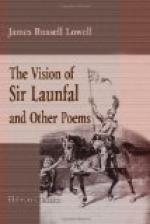25-26. Clear fame: Compare Milton’s Lycidas:
“Fame is the spur that
the clear spirit doth raise
To scorn delights and live
laborious days.”
32. Half-virtues: Is Lowell disparaging the virtues of peace and home in comparison with the heroic virtues of war? Or are these “half-virtues” contrasted with the loftier virtue, the devotion to Truth?
34. That stern device: The seal of Harvard College, chosen by its early founders, bears the device of a shield with the word Ve-ri-tas (truth) upon three open books.
46. Sad faith: Deep, serious faith, or there may be a slight touch of irony in the word, with a glance at the gloomy faith of early puritanism and its “lifeless creed” (l. 62).
62. Lifeless creed: Compare Tennyson’s:
“Ancient
form
Thro’ which the spirit
breathes no more.”
73. The tide of the ocean in its flow and ebb is under the influence of the moon. To get the sense of the metaphor, “fickle” must be read with “Fortune”—unless, perchance, we like Juliet regard the moon as the “inconstant moon.”
81. To protect one’s self everyone connives against everyone else. Compare Sir Launfal, I. 11. Instead of climbing Sinais we “cringe and plot.”
82. Compare Sir Launfal, I. 26. The whole passage, II. 76-87, is a distant echo of the second and third stanzas of Sir Launfal.
83-85. Puppets: The puppets are the pasteboard actors in the Punch and Judy show, operated by unseen wires.
84. An echo of Macbeth, V, 5:
“Life’s but a
walking shadow, a poor player
That struts and frets his
hour upon the stage,
And then is heard no more.”
97. Elder than the Day: Elder than the first Day. “And God called the light Day,” etc. (Genesis i, 5.) We may have light from the divine fountains.
110-114. In shaping this elaborate battle metaphor, one can easily believe the poet to have had in mind some fierce mountain struggle during the war, such as the battle of Lookout Mountain.
111. Creeds: Here used in the broad sense of convictions, principles, beliefs.
115-118. The construction is faulty in these lines. The two last clauses should be co-ordinated. The substance of the meaning is: Peace has her wreath, while the cannon are silent and while the sword slumbers. Lowell’s attention was called to this defective passage by T.W. Higginson, and he replied: “Your criticism is perfectly just, and I am much obliged to you for it—though I might defend myself, I believe, by some constructions even looser in some of the Greek choruses. But on the whole, when I have my choice, I prefer to make sense.” He then suggested an emendation, which somehow failed to get into the published poem:
“Ere yet the sharp,
decisive word
Redden the cannon’s
lips, and while the sword.”




